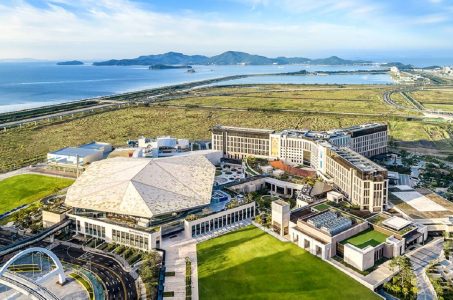Macau Concessionaires Packing on Debt
Posted on: March 17, 2022, 08:07h.
Last updated on: March 17, 2022, 11:37h.
Macau’s six gaming operators are seeing debt burdens swell in the wake of the coronavirus pandemic, and that’s a drag on equity prices, says Morgan Stanley.

Prior to the global health crisis, the concessionaires had just $5 billion in combined liabilities. But that figure has since risen to $20 billion and is on pace to eclipse $23 billion by the end of this year. A recent surge of COVID-19 cases in mainland China and Hong Kong — two of the major travel arteries to Macau — is extending what’s now a lengthy road to recovery for the world’s largest casino center, pressuring long-slumping share prices in the process.
In the last six quarters since the international visa scheme (IVS) opening between Macau and the mainland, the industry has tracked Chinese visitation at 20-30 percent of 2019 level, mass revenue at 30-40 percent of 2019 level and earnings before interest, taxes, depreciation and amortization (EBITDA) at breakeven or five percent of 2019 level,” write Morgan Stanley analysts Praveen Choudhary and Gareth Leung in a note to clients.
After dealing with a 15-day casino closure in February 2020 and subsequent travel restrictions, some Macau operators tapped capital markets, taking on debt to simply stay afloat, as multimillion-dollar daily operating costs remained constant as revenue plunged.
Macau Operators Waiting on Free Cash Flow
While many Macau concessionaires have been EBITDA positive since the second half of 2020, analysts and investors are waiting on the return of free cash flow.
On the basis of free cash flow to equity (FCFE), only Galaxy Entertainment Group is currently positive. Morgan Stanley sees Melco Resorts and Sands China getting there if revenue returns to 50% of 2019 levels. That outlook is based on a recovery in mass market visitation.
Standard & Poor’s (S&P) forecasts EBITDA for Las Vegas Sands (NYSE:LVS), the parent company of Sands China, will be 35% to 50% of 2019 levels this year, and 80% in 2023. However, S&P is constructive on recovery among mass-market gamblers — a positive for Sands, because that’s the operator’s core constituency.
The ratings agency recently lowered that operator’s credit grade to “BB+” – one notch into junk territory – from “BBB-”.
Lingering Risks, Upside Potential
Licensing risk has mostly faded in Macau, as it appears authorities in the special administrative region (SAR) will extend concessionaires’ permits for 10 years, while not opening the market to new competitors.
However, that window is shorter than the previous licensing period and could make it difficult for operators to realize an adequate return on investment on large-scale projects. That’s a point to consider, as Macau wants concessionaires to boost non-gaming amenities in a bid to diversify the SAR’s economy.
On the upside, Morgan Stanley sees 20% to 30% for Macau operators’ shares, though EBITDA normalization could be up to two years away.
Related News Articles
South Korea’s Foreigner-Only Casinos See Mixed Performances in October
Sands Rebound Needs Two More Years, Says Moody’s
Macau Casino Stocks Worth Revisiting After Declines, Says Analyst
Most Popular
Las Vegas Overstated F1 Race’s Vegas Impact — Report
Vegas Strip Clubs Wrestle in Court Over Animal Names
Most Commented
-
End of the Line for Las Vegas Monorail
— April 5, 2024 — 90 Comments -
Mega Millions Reportedly Mulling Substantial Ticket Price Increase
— April 16, 2024 — 6 Comments -
Nearly Abandoned Mall Outside Vegas Soon to Have Only One Tenant
— March 12, 2024 — 5 Comments
















No comments yet